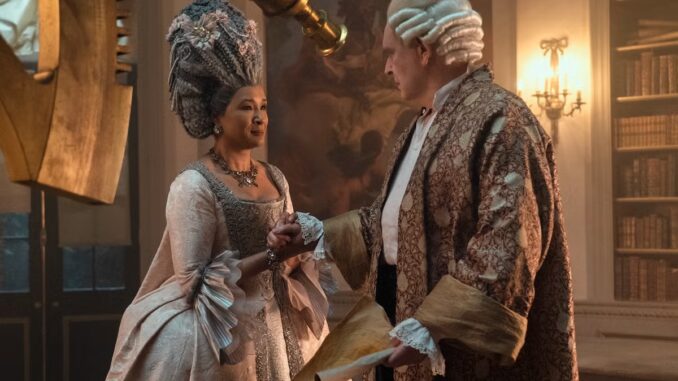
The Bridgerton prequel addresses—and ultimately refutes—an age-old maxim about mental illness.
Spoilers below for the entirety of Queen Charlotte: A Bridgerton Story.
“Are there any signs?”
These words, spoken by Princess Augusta (Michelle Fairley) to her son, King George (Corey Mylchreest), upon the birth of his own son in the finale of Netflix’s Queen Charlotte, are intended to sound familiar. Not everyone who binges the elegant Bridgerton spin-off will have heard them spoken before, but enough will recognize the weight of their implication. These words are part of a larger question Augusta is asking, not only about her grandson’s health, or even his fitness to rule, but about the path he will walk in life. Will he be normal? Will he be accepted? Will he have enough—be enough—to earn the status of the fully human?
This uneasiness is a frequent refrain in the lives of those with mental illness, and in those who’ve witnessed its effects on their loved ones. How are they doing today? Can you keep an eye on them? Did they take their meds? Did you? How are you feeling? Are there any signs?
In Queen Charlotte, King George is “mad.” We know this both from the context of the show and from history: The real-life King George III, who lost the American colonies, has carried the legacy as the “mad king” ever since. He was considered unfit to rule in the final decade of his life, and so he passed the crown on to his son, George Augustus Frederick, the Prince Regent, beginning the so-called Regency era in 1811. This son then became king after George III’s death in 1820.
Even centuries later, George’s exact diagnosis remains unclear, if an enduring source of fascination. In the 1960s, a mother-and-son psychiatrist pair said the king had a genetic blood disorder known as acute porphyria, which affects the nervous system, and the theory went on to garner what Timothy Peters would later claim in a 2011 issue of researcher Clinical Medicine was “unwarranted support.” More recent research argues against the porphyria hypothesis. Peter Garrard, a researcher at St. George’s, University of London who studied the late king’s illness, told the BBC in 2013 that the porphyria theory “is completely dead in the water” and that George endured “a psychiatric illness.”
The most likely explanation for George’s so-called “madness,” then, is some form of bipolar disorder, of which the king experienced perhaps four or five episodes, per Clinical Medicine. During these periods, his behavior was marked by “agitation, rambling incoherent speech, and episodes of violence and sexual impropriety,” according to a paper published in PLOS One by Garrard, Peters, and their co-researchers Vassiliki Rentoumi and Jonathan Conlin.
A precise diagnosis is not explored in Queen Charlotte, nor does it particularly matter in the context of the story. What matters was (and is) the perception of George as “mad,” and what was to be done about it.
When Princess Augusta asks George if her newborn grandson is showing “signs,” George replies with a question to which he already knows the answer: “Of what, Mother?” She feigns innocence: “I am only asking.”
She is not only asking. She is orchestrating a strategy. She is responsible, however unintentionally, for the damage inflicted on her son by the doctor she enlisted (Guy Henry). This Doctor Monro’s violent techniques included—among other creative tortures—dunking George’s head repeatedly into ice-cold water, slapping him, starving him of nutrients, and leeching him. As the audience, we watch enough of these moments that they only narrowly avoid the territory of trauma porn, which would imply such actions were grotesque but necessary for George to become worthy of his new bride.
The limited series escapes this fate by an inch, largely in its meta-criticism of both Monro and Augusta as characters. Monro is an obvious maniac, but the more intriguing aspect of his dark personality is not the ominous way in which she shaves his liege’s face, but in the control he clearly loves exerting over the monarch. “In here, you are just another animal in a cage, and just like an animal, I will break you,” he told George during one of these anguished sequences. Augusta never comes out and says as much, and it’s understood she’d never approved of Monro’s methods were she to learn of their depravity. But her desire to observe, subdue, and—ideally—control her son lurks beneath every one of her interactions, with him and with others in his court. Her power is tethered to him. Are there any signs?
In contrast, there is Queen Charlotte (India Amarteifio) herself, who addresses her husband’s “madness”—once she finally learns of it in later episodes—with a sort of foolhardy determination. She shuttles him away from Monro and leaves him to his farming and his observatory as she prepares for the delivery of their first child.